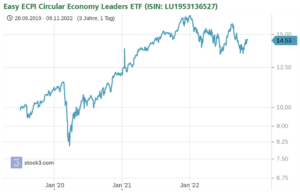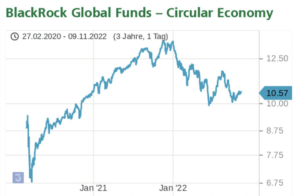Regardless of whether it’s plastic, metal, or wood fibres – more and more companies are turning to production methods that enable materials to be recycled in a cycle. In a recent study conducted by consultancy firm Roland Berger, it is estimated that global sales of technologies for the development of the circular economy will amount to 263 billion euros by 2030. Moreover, environmental technologies that improve raw materials and material efficiency are projected to achieve a six-fold volume growth during the same time period. By Stefan Riedel
Beyond question, the industrial sector holds the biggest potential for the circular economy. The applications range from the recycling of raw materials from electronic devices to the treatment of liquids such as oils, coolants and emulsions, metal waste, and the entire medical sector to the recycling of batteries from electric vehicles. Solutions that extend the service life of products and the reusing of water resources are two other big areas for the implementation of the circular economy. Over 32 billion cubic meters of water are lost through leakage every year. 80 percent of wastewater worldwide is currently discharged without treatment.
Circular economy as key investment theme
From an investor’s point of view, the circular economy opens up a huge potential for multi-billion revenues. Identifying the protagonists and future market leaders is the key factor. For Natalie Falkman, portfolio manager at Robeco, the circular economy has long been a key factor in containing the effects of global climate change: “In the European taxonomy, the circular economy is one of the first six climate goals. The transition to a circular economy is, therefore, a clear must and not just a nice-to-have.” According to Falkman, a wide range of intertwining factors should accelerate the transition to a circular economy. New regulations and technological innovations play a crucial role, just as new sharing business models as well as consumers’ increasing preference for ecologically clean labels.
No wonder then that a growing number of investment companies are taking up the disruptive potential of the circular economy with their products. Lombard Odier Investment Managers (LOIM), for example, has integrated all circular economy principles aiming to leverage the benefits of the circular economy into the investment strategy of its three funds: Natural Capital, New Food Systems, and Plastic Circularity. “Our focus is on understanding the roadmap to a lower carbonised green economy and which companies will be the driving forces for it,” explains Khangzhen Leow, Senior Sustainability Analyst at LOIM. Craig Cameron, fund Manager at Franklin Templeton, explains that his team has been managing the circular economy theme since 2018 in the Templeton Global Climate Change Fund with a consistent process: “One of our climate solutions category is water waste management which aims to invest in companies that are building circular processes. Examples include highly-recyclable packaging, along with water companies building desalination and circular water treatment facilities.”

Different investment approaches
Rocchino Contangelo, Head of Global ESG Integrated Research at Swisscanto, sees the most notable potential in the raw materials sector: “In order to counteract a possible supply deficit, the recycling of copper, for example, must be further expanded. In addition, the recyclability of EV batteries will play an important role in about seven years, when the first batteries have reached their service life.” At Pictet Asset Management, where thematic funds play an important role, the circular economy theme is being covered across various industries, “precisely because the circular economy forms an integral part of our entire economic system,” says Simon Frank, an expert in sustainable thematic investments at Pictet. For this reason, several Pictet funds such as the Pictet Environmental Opportunities (sustainable environmental solutions), Pictet-Clean Energy (sustainable energy), Pictet-Nutrition (sustainable food solutions), Pictet-Timber (forest and wood industry) and Pictet-Water (water management) have overlapping points with the circular economy theme.
In this context, the clients of investor companies are playing an increasingly important role as input providers. “We have been experiencing an increased dialogue on this topic with institutional clients for several years. The area of resource efficiency, for example in materials management or the food industry, plays an important role for them,” explains Mike Judith, Head International Sales at DNB Asset Management. “Moreover, fund of funds investing in our strategies are facing increasing criteria like circular economy in discussions with their clients.”

Growing fund universe
The investment funds show a continuously growing number of products focusing on climate protection and sustainability, with circular economy factors being integrated into the portfolio selection process. It has to be pointed out that many technologies are still in their early stages of development and that many clear market leaders still have to be identified. “Investors should therefore diversify their investments and not put everything in one technology or one company,” stresses Pictet expert Frank. Environmental funds diversify the risk by diversifying resource efficiency among several companies.
Among the ETF investments, the Easy ECPI Circular Economy Leaders ETF from the French bank BNP Paribas (ISIN LU1953136527) provides access to the 50 global leaders in the circular economy that are included in the ECPI Circular Economy Leaders divisional index. The methodology of this index is primarily based on environmental, social, and governance (ESG) criteria from globally listed companies. In the selection process for the index members, the following criteria are included: the concept of the circular model, material recovery, extension of the product lifespan, platforms for information exchange, and the range of products and services (cloud, leasing, sharing).

Three funds explicitly focus on companies whose products and technologies are geared towards the circular economy. Launched in January 2020, RobecoSAM Sustainable Circular Economy Equities (LU2092758726) invests in companies with resource-efficient business models linked to the manufacture and consumption of consumer goods. Fund manager Natalie Falkman focuses on companies benefiting from better logistics and waste management systems, as well as from the full digitisation of outdated business models through digital collaboration platforms.
With its current volume of around 1.6 billion euros, the BlackRock Global Funds – Circular Economy (LU2041044178) is one of the heavyweights in this segment. At least 80 percent of total assets are invested in equities of companies around the world that benefit from or contribute to the advancement of the circular economy. The fund management focuses on companies that treat or process raw materials and contribute to the progress of the circular economy – as users, pioneers, profiteers, and business model winners.
The Candriam SRI Equity Circular Economy Fund (LU2109440870), which was launched in April 2020, invests globally in companies that provide solutions for the transition to a circular economy society. The focus is on companies that offer innovations and solutions in the areas of waste management, renewable resources, extending the lifespan of products and services, and optimising resources (“enablers”). At 62 percent, US companies are clearly overrepresented and also make up the largest positions with Waste Management, Darling Ingredients, Procter & Gamble, and American Water Works.
Read more about the circular (bio)economy in the e-magazine:
https://www.goingpublic.de/aktuelles-epaper-lifesciences/
Autor/Autorin

Stefan Riedel
Stefan Riedel ist freier Autor bei GoingPublic Media und selbständiger Redakteur mit Schwerpunkt Finanzen und Wirtschaft.



